#BJP environmental initiatives
Explore tagged Tumblr posts
Text
BJP Leader Geeta Murmu Launches 'A Tree for Mother' Campaign
Tree plantation drive inaugurated in Galudih by BJP’s Geeta Murmu to promote environmental conservation. A tree plantation campaign titled ‘A Tree for Mother’ was launched by BJP leader Geeta Murmu in Galudih. JAMSHEDPUR – Under the leadership of BJP leader and Galudih Mandal in-charge Geeta Murmu, the ‘A Tree for Mother’ campaign was launched on Saturday in Ullda and Barakhurshi villages of…

View On WordPress
#A Tree for Mother campaign#जनजीवन#Barakhurshi village news#BJP environmental initiatives#environmental conservation Jharkhand#Galudih Mandal in-charge#Galudih tree plantation#Geeta Murmu BJP#Jamshedpur latest updates#JHARKHAND NEWS#Life#Ullda Panchayat event
0 notes
Text
New Policies of Rajasthan Government Unveiled: Col Rajyavardhan Rathore
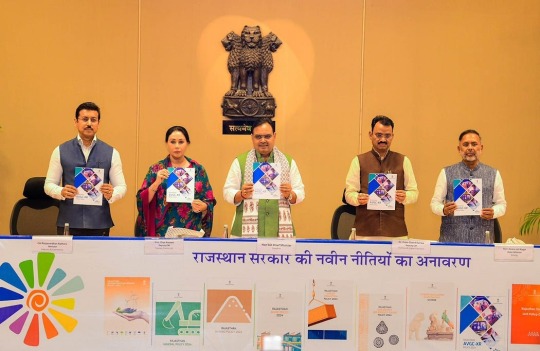
Rajasthan, known for its cultural heritage and historic prominence, is making waves with forward-thinking policies designed to usher in a new era of growth and development. Col Rajyavardhan Rathore, a dynamic leader and advocate of progress, has been instrumental in shaping and supporting these initiatives. These policies aim to address critical areas such as economic development, environmental sustainability, social equity, and digital transformation, marking a significant step forward for the state.
A Vision for Progress
The new policies reflect the Rajasthan government’s commitment to fostering innovation, inclusivity, and sustainability. By targeting various sectors, from education and infrastructure to technology and rural development, these initiatives promise a brighter and more prosperous future for all.
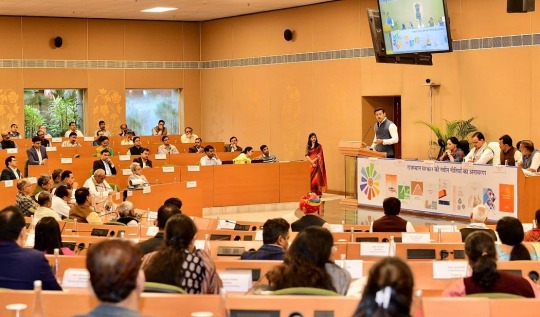
Key Policies Unveiled
1. Rajasthan MSME Policy 2024
Micro, Small, and Medium Enterprises (MSMEs) form the backbone of Rajasthan’s economy. This policy aims to:
Provide financial assistance and subsidies to MSMEs.
Simplify regulatory processes to encourage entrepreneurship.
Create employment opportunities, especially in rural areas.

2. One District, One Product (ODOP) Scheme
To boost local businesses and crafts, the ODOP scheme promotes:
Identifying unique products in each district for focused development.
Establishing market linkages and export support.
Providing branding and marketing assistance to artisans and producers.
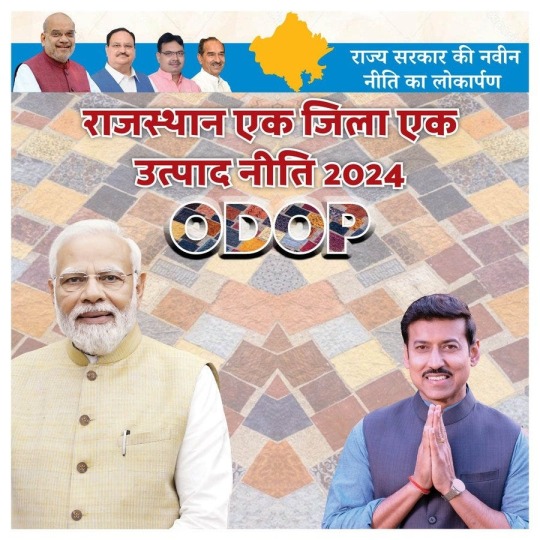
3. Rajasthan Startup Policy 2024
The state’s focus on fostering innovation is evident through its startup-friendly policies, which include:
Seed funding and incubation support for startups.
Incentives for women-led and rural-based startups.
Establishing innovation hubs across districts.

4. Integrated Cluster Development Scheme
This policy aims to modernize and empower traditional industries by:
Developing common facilities for industrial clusters.
Providing training programs for workers in emerging technologies.
Enhancing infrastructure to attract investments.
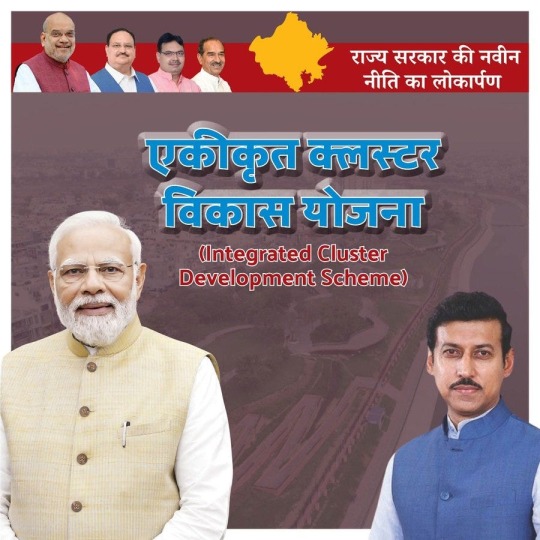
5. Rajasthan AVGC-XR Policy 2024
Focusing on the Animation, Visual Effects, Gaming, and Extended Reality (AVGC-XR) sectors, this policy includes:
Setting up AVGC-XR training institutes.
Providing subsidies for software and hardware procurement.
Promoting Rajasthan as a hub for creative industries.

Environmental Sustainability Policies
6. Rajasthan Green Energy Initiative
To combat climate change and boost renewable energy production, the policy emphasizes:
Developing large-scale solar and wind energy projects.
Offering incentives for businesses to adopt green energy solutions.
Encouraging electric vehicle adoption through subsidies.
7. Water Conservation Policy
Addressing water scarcity in Rajasthan, this policy includes:
Promoting rainwater harvesting and groundwater recharge.
Modernizing irrigation systems to improve efficiency.
Encouraging community-driven water conservation efforts.
Social Development Policies
8. Rajasthan Women Empowerment Scheme
Aimed at promoting gender equality, this policy focuses on:
Providing skill training and entrepreneurship opportunities for women.
Ensuring safety and security through improved law enforcement.
Offering financial incentives for girls’ education.
9. Antyodaya Seva Camp Initiative
Launched to mark the successful completion of the BJP government’s first year, this program:
Provides direct access to government schemes and services.
Ensures welfare benefits reach the most marginalized communities.
Organizes awareness drives about social and economic rights.
Education and Digital Transformation
10. Rajasthan DigiSkill Program
To prepare the workforce for a digital future, this program includes:
Training in digital tools, AI, and coding for youth.
Setting up digital labs in schools and colleges.
Offering certifications in high-demand IT skills.
11. Rajasthan Education Excellence Policy
Focused on improving education quality across the state, the policy entails:
Modernizing school infrastructure and integrating digital tools.
Recruiting highly qualified teachers for rural and underserved areas.
Enhancing vocational training opportunities.
Economic Growth and Investment Policies
12. Rising Rajasthan Global Investment Summit
This annual event highlights the government’s commitment to attracting global investments by:
Showcasing Rajasthan’s potential in IT, manufacturing, and tourism.
Facilitating investor-friendly policies and incentives.
Establishing Special Economic Zones (SEZs) for key industries.
13. Rajasthan Export Promotion Policy
Aimed at boosting exports, this policy provides:
Support for exporters through subsidies and infrastructure.
Promotion of Rajasthan’s traditional handicrafts and textiles globally.
Setting up export training centers for budding entrepreneurs.
Col Rajyavardhan Rathore: A Champion of Progress
Col Rajyavardhan Rathore has been a driving force behind these transformative policies. His efforts include:
Advocating for inclusive and sustainable growth.
Encouraging public-private partnerships to enhance infrastructure and investment.
Ensuring that government initiatives are accessible and impactful at the grassroots level.
Impact of the New Policies
Economic Growth
Increased investments in key sectors like IT, renewable energy, and manufacturing.
Growth in MSMEs and startups, creating job opportunities.
Social Development
Enhanced opportunities for women and marginalized communities.
Improved access to education and healthcare.
Sustainability
Progress in renewable energy adoption and water conservation.
Reduced carbon footprint through green energy initiatives.
The Road Ahead
With these policies, Rajasthan is poised to become a leading state in innovation, sustainability, and social equity. The government’s commitment, supported by leaders like Col Rajyavardhan Rathore, ensures that this vision translates into reality. As the state charts its path forward, it sets a benchmark for holistic and inclusive development in India.
2 notes
·
View notes
Note
Is India really going to be renamed as 'Bharat'?
Aah you are gonna get me banned from here and red listed by the Indian govt 😭😭😭 buckle up, this will be a long one
So, bharat is already a name for the country. It's the Indian hindi name. So the constitutions Article 1 says 'India that is Bharat shall be a union of states.....' so it's already a name.
Now the government seemingly had no problems with the name ' India' before this month really. Infact in 2016 some conservative nationalist had gone to the Supreme Court petioning that we need to change the name since 'India's a foreign name, colonial etc etc' and back then, the same government had said no need to change it, it's the choice of the people. You wanna call it India you can, or if you wanna call it Bharat you can.
Now it's just rumors at this point but the people have been saying pretty much that the government is going to change the name. Media houses have hyped the rumor up. Celebrities have jumped in etc. Full on political storm at this point.
So the issue comes from the fact that the opposition basically all the opposition parties came together and formed an Alliance for the next elections happening in 2024 and they named themselves I.N.D.I.A. And since the day they formally decided to come together, it's only been political drama. Now you can easily guess where this thing about changing the name has come from. It's nothing but blatant insecurity.
The ruling party is not doing well there's been a lot of issues of their own doing. They're losing state elections. They've lost a lot of momentum due to their mishandling of a lot of things especially the Civil War situation in the state of Manipur, the way they have used religion as a way to divide people all across the country, the very high inflation, the basically non response to the environmental crisis - sinking of Joshimath, flash floods all across the country this monsoon, the washing away of roads, buildings collapsing like a house of playcards basically in the state of himachal. The government's Covid response? Disgusting.
Then there's a lot of other problems like for example the Indian wrestlers were protesting against the chairman of their federation. He's a bjp mp and the atheletes were accusing him of sexual harassment and the government didn't respond for a long time. He resigned but he still an MP in Parliament by the way.
Then the controller and auditor general (CAG) the one who actually audits the govt accounts, all the expenditure on the Indian treasury etc. They've actually released reports saying that a lot of the developmental projects have used excess money than what they were supposed to have used as per the initial estimates so that's another thing. Also there's very little press freedom, almost non exisitent freedom for activists. There's very little transparency especially when it comes to things established by this government.
They also tend to also put the laws in the constitution on the back burner and do their own thing as per their own whims. Don't even get me started on the kind of expenditure they are doing for the G20 summit happening right now. And the other things surrounding it in terms of organization etc, just search about what they've done to the low income areas of Delhi during this time on the internet and you'll find out
These are just a few issues, there's a lot more and I'm not putting them here since it's already turned into an essay. But safe to say that M*di and his govt would have had very stiff competition in the elections next year because a large population of the people are just not interested in their whataboutry now and want the real tangible things to be done on ground in terms of Healthcare, planning, education etc.
And if they actually do it, change the name I mean then it is basically a last ditch by the government to get their ardent supporters back on their side, give them a shot of nationalism and make sure they vote for them next year.
Legally speaking article 1, which I mentioned above it can be amended but till what level can you amend it? That's what I'm unsure about and I have been researching for the past few days, so still in the process of it. Because the thing is that the Indian constitution is both rigid as well as flexible. Basically means that, you can amend the constitution but you can't encroach upon or you can't change its basic structure like the main tenants which make it the document that it is. So I'm not particularly sure over how much the first article be amended to facilitate this name change. It's not even a name change really it's the deletion of one of the names.
The name which is basically what everybody knows the country as. If they do change it then it would be nothing but a political gimmick but also it will be a waste of a lot of taxpayer money. I'm honestly scared to calculate how much it would cost and what all would need to change from people's legal documents, to names of state institutions, their documents, the public sector firms, educational institutions etc.
Another issue is the language, Bharat is the Hindi name and a lot of states might not accept given the fact that their local languages have always been given a lower position as compared to the North Indian Hindi. Then there's the history attached to it the name India and the govt will be basically bulldozing all that has been associated with it if they delete it.
Now people who've never actually opened a book up in their lives say that this is a name given by the British so it's our Colonial Legacy etc, but the thing is the name 'India' is actually related to the ancient Greeks who used to trade with the people of the indus Valley civilization. Locally the indus river was known as 'sindhu' and they in their own language translated it to 'indus' and thus, the word India came into being - the people who lived on the indus Valley were thus called 'Indians'. And then this name India given by the Greeks was later exported to other western cultures etc. So not a colonial Legacy after all.
A lot of other things also but the gist is that the name change/name deletion situation is a very slippery slope to go down.
Once again saying that it's just rumors at its point, but I won't be surprised that they are thinking it. the government is known to take pretty significant and often rash decisions without any prior information to anybody. Still it's just rumors till now.
6 notes
·
View notes
Text
https://louhangaround.mn.co/posts/60722377
What Does the Political Bulldozer Mean in BJP Politics? Exploring Its Impact in India
Introduction to the Political Bulldozer Phenomenon
In recent years, the term “political bulldozer” has gained prominence in Indian political discourse, particularly associated with the Bharatiya Janata Party (BJP) and its approach to governance. This article delves into what the political bulldozer signifies within BJP politics, its implications, and the controversies surrounding its implementation.
Understanding the Concept of the Political Bulldozer The term “political bulldozer” metaphorically refers to a robust and assertive approach by political leaders or parties to swiftly implement policies or decisions, often with forceful actions and minimal tolerance for opposition. This approach aims to break through bureaucratic hurdles, streamline administrative processes, and progress significant reforms or projects.
Origins and Usage in Indian Politics Since around 2017, the bulldozer concept, prominently used by leaders like Yogi Adityanath of the BJP, has exemplified a no-nonsense governance style aimed at rapid development and effective administration. This approach often involves decisive actions such as demolishing illegal structures, clearing encroachments, and implementing infrastructure projects with accelerated timelines.
The Impact of the Political Bulldozer Approach Infrastructure Development and Urban Renewal The bulldozer approach in BJP-led states has been closely associated with urban renewal and infrastructure development initiatives. Under this strategy, road expansions, metro rail construction, and innovative city initiatives have benefited from streamlined approval processes and expedited implementation.
Controversies and Criticisms Despite its perceived effectiveness in delivering results, the bulldozer approach has faced criticism for its perceived authoritarian tendencies and lack of adequate consultation with affected communities. Instances of forceful evictions and environmental concerns have sparked debates about balancing development with socio-environmental sustainability.
Political Strategy and Symbolism Beyond governance, the political bulldozer is a symbolic tool for projecting strength and decisiveness, which resonates with the BJP’s electoral base. It reinforces the party’s image as a proactive force capable of driving change and overcoming bureaucratic inertia.
Case Studies and Examples Uttar Pradesh under Yogi Adityanath Yogi Adityanath, as Chief Minister of Uttar Pradesh, has been a prominent advocate of the bulldozer approach. His administration’s crackdown on illegal slaughterhouses and encroachments is cited as an example of rigorous law and order enforcement combined with economic policy.
Other BJP-ruled States, Such as Gujarat, Maharashtra, and Karnataka, have adopted similar strategies under BJP leadership, focusing on infrastructure projects and industrial development with a decisive administrative approach.
Conclusion In conclusion, the political bulldozer in BJP politics represents a proactive and assertive governance style to accelerate development and overcome bureaucratic hurdles. While it has yielded tangible results in infrastructure and urban renewal, its implementation has also sparked controversies regarding human rights, environmental sustainability, and democratic governance principles.
For more insights into BJP’s governance strategies and their impact, visit Case Construction India to understand how decisive leadership influences policy and development in India.
This article aims to enhance understanding of the political bulldozer phenomenon within BJP politics by providing accurate and comprehensive information and offering insights into its implications for governance and society in India.
0 notes
Text
Beyond Politics: Anantkumar Hegde's Mission for Environmental Sustainability
Anantkumar Hegde, a prominent Member of Parliament (MP) representing the Bharatiya Janata Party (BJP), emerges as a distinctive figure in Indian politics, marked by his unwavering dedication to environmental conservation and social welfare. His multifaceted approach towards governance, deeply rooted in his values and convictions, underscores his role as a compassionate caretaker of both the environment and society, utilizing the platform of politics for the greater good.
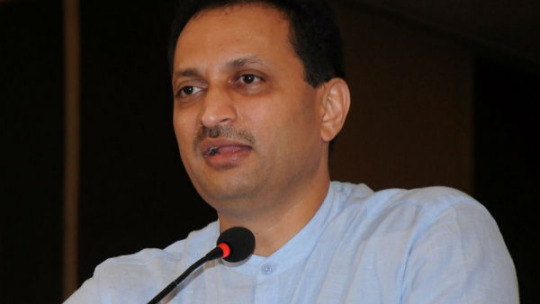
At the core of Anantkumar Hegde’s political ethos lies a profound commitment to environmental preservation. Through his official website, one can glean insights into his extensive endeavors aimed at safeguarding the natural world. From advocating for sustainable development practices to spearheading initiatives for afforestation and wildlife conservation, Hegde’s environmental consciousness permeates every aspect of his political career. His vision transcends mere rhetoric, as evidenced by his active involvement in various conservation projects and policy advocacy to combat climate change and mitigate environmental degradation.
Hegde’s passion for environmental stewardship is not confined to legislative chambers but extends to grassroots engagement and community empowerment. By leveraging his position as an MP, he initiates dialogues, fosters collaborations, and mobilizes resources to address pressing environmental challenges at the local and national levels. Through his proactive approach, he empowers communities to become guardians of their natural surroundings, instilling a sense of responsibility towards ecological sustainability.
Furthermore, Anantkumar Hegde emerges as a compassionate social caretaker, utilizing the levers of politics to uplift the marginalized and vulnerable sections of society. His website highlights his concerted efforts towards social welfare, including initiatives focused on education, healthcare, and empowerment of disadvantaged groups. Hegde’s advocacy for inclusive policies and equitable distribution of resources reflects his unwavering commitment to social justice and human dignity.
In a political landscape often marred by divisiveness and polarization, Hegde stands out as a unifying force, bridging gaps and fostering solidarity among diverse communities. Through his outreach programs and grassroots initiatives, he cultivates a culture of empathy, understanding, and mutual respect, thereby fostering social cohesion and harmony.
In conclusion, Anantkumar Hegde emerges as a beacon of hope and inspiration in Indian politics, epitomizing the transformative power of principled leadership and compassionate governance. Through his tireless advocacy for environmental conservation and social welfare, he demonstrates the profound impact that politics can have in creating positive change for both people and the planet. As India navigates the complex challenges of the 21st century, leaders like Anantkumar Hegde serve as guiding lights, steering the nation towards a future defined by sustainability, inclusivity, and prosperity for all.
0 notes
Text
Poonamben Maadam’s Roadmap to Economic Improvement
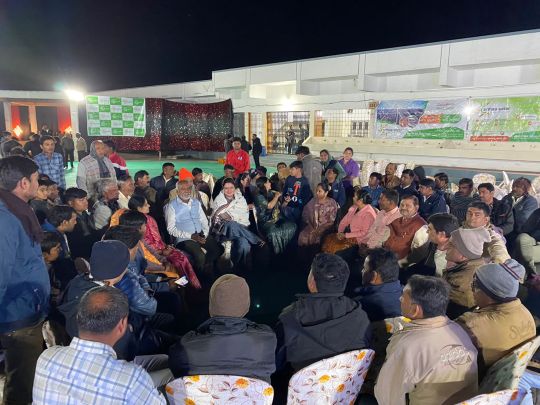
Jamnagar is a vibrant city nestled along the pristine coastline of Gujarat. It has now emerged as a budding tourist destination, thanks to the contributions of Poonamben Maadam, a member of the Bhartiya Janta Party (BJP), and her leadership. Poonamben Maadam's efforts to promote tourism in Jamnagar through the development of transportation and infrastructure have not only enriched the cultural tapestry of the region but have also contributed significantly to Gujarat's GDP.
Contribution of Jamnagar to Gujarat's GDP:
Jamnagar is renowned for its rich cultural heritage, stunning landscapes, and architectural marvels and thus has the potential to play a pivotal role in driving Gujarat's economic growth. The city's strategic location, coupled with its burgeoning industries and thriving tourism sector, has made it a key contributor to the state's GDP. With its bustling ports, flourishing businesses, and infrastructure, Jamnagar serves as an economic powerhouse, attracting investments and fostering prosperity.
Poonamben Maadam's Role in Developing Tourism:
Poonamben Maadam has been instrumental in harnessing the tourism potential of the region. Recognizing the allure of Jamnagar's natural beauty and cultural heritage, she has tried to showcase the city's splendor to the world. Through her initiatives and policies, Poonamben Maadam has succeeded in positioning Jamnagar as a tourist destination in Gujarat.
Promotion of Cultural Heritage and Infrastructure:
Poonamben Maadam's unwavering commitment to preserving and promoting Jamnagar's cultural heritage has been a cornerstone of her tourism development strategy. Her initiatives to restore ancient monuments, heritage sites, museums, and the development of overall transportation and increase connectivity offer visitors a glimpse into the city's glorious past. By organizing cultural festivals, exhibitions, and heritage walks, Poonamben Maadam has breathed new life into Jamnagar's cultural landscape, attracting tourists from far and wide.
Under her leadership, Jamnagar has witnessed significant investments in the development of transportation networks, accommodation facilities, and recreational amenities. The modernisation of airports, construction of hotels and resorts, and improvement of road connectivity have made Jamnagar more accessible and tourist-friendly.
Ecotourism and Sustainable Development:
Poonamben Maadam's commitment to sustainable tourism practices has been evident in her emphasis on ecotourism and environmental conservation. Recognizing the ecological significance of Jamnagar's tourism has also made use of its coastal ecosystems, she has advocated for the protection of mangroves, coral reefs, and marine life. Through ecotourism initiatives such as nature trails, birdwatching tours, and marine conservation programs, Poonamben Maadam has promoted responsible tourism while doing her best to safeguard the natural environment.
Future Prospects of Jamnagar’s Tourism:
As Jamnagar continues to evolve as one of the most sought-after tourist destinations, the future looks promising. With ongoing efforts to diversify tourism offerings, improve infrastructure, and uphold sustainable practices, Jamnagar is poised to attract a growing number of visitors and contribute even more significantly to Gujarat's GDP. Poonamben Maadam’s steadfast dedication to unlocking Jamnaga’'s tourism potential ensures that the city will shine bright on India’s tourism map for years to come.
Poonamben Maadam's vision and leadership have been instrumental in positioning Jamnagar as a great tourist destination in Gujarat. Through her strategic initiatives, promotion of cultural heritage, and commitment to sustainable development, she has transformed Jamnagar into a tourism hub, while also strengthening her constituency’s economic progress.
0 notes
Text
BJP's Poonamben Maadam Proposes Landmark Waste Management Bill in Lok Sabha

Poonamben Maadam, the Member of Parliament for Jamnagar representing the Bhartiya Janta Party (BJP), has introduced a groundbreaking proposal in the Lok Sabha. The Wind Turbine and Solar Energy Waste (Handling, Disposal, and Recycling) Bill, 2022, proposed by Maadam, shows the BJP's commitment to sustainable development.
The bill, proposed by Poonamben Maadam, addresses the critical issue of waste management in renewable energy technologies. As India progresses towards embracing renewable energy sources, it's important to ensure that environmental concerns are adequately addressed.
Poonamben Maadam's proactive approach to environmental issues aligns with the BJP's vision for a cleaner and greener India. By advocating for strict and thorough regulations on waste handling and recycling, Maadam showcases the party's dedication to responsible governance and sustainable progress.
While the bill enjoys support from various quarters, discussions in the Lok Sabha continue to deliberate its implementation and potential impacts. However, with Poonamben Maadam's leadership, there is optimism that this legislation will pave the way for a more eco-friendly energy landscape in India.
As the Lok Sabha debates the Wind Turbine and Solar Energy Waste Bill, 2022, Poonamben Maadam's initiative shows the BJP's commitment to environmental management and responsible governance. In Jamnagar, Maadam's constituents can take pride in her proactive stance on issues vital to both local and national interests.
#poonamben#poonambenmaadam#poonammaadam#bjpnews#bjp4india#bjp government#bjpcandidate#general news#world news#breaking news#celebrity news#latest news
1 note
·
View note
Text
Anantkumar Hegde emerges as a distinctive figure in Indian politics: Underscores his role as a compassionate caretaker of both environment and society
Anantkumar Hegde, a prominent Member of Parliament (MP) representing the Bharatiya Janata Party (BJP), emerges as a distinctive figure in Indian politics, marked by his unwavering dedication to environmental conservation and social welfare. His multifaceted approach towards governance, deeply rooted in his values and convictions, underscores his role as a compassionate caretaker of both the environment and society, utilizing the platform of politics for the greater good.
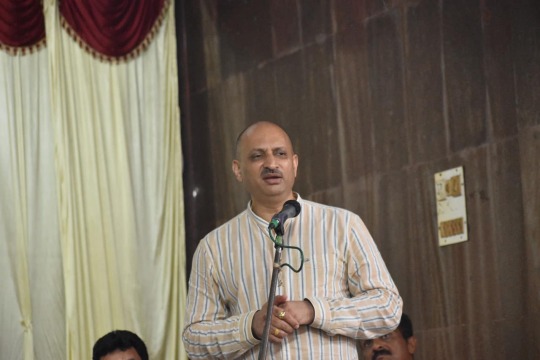
At the core of Anantkumar Hegde's political ethos lies a profound commitment to environmental preservation. Through his official website, one can glean insights into his extensive endeavors aimed at safeguarding the natural world. From advocating for sustainable development practices to spearheading initiatives for afforestation and wildlife conservation, Hegde's environmental consciousness permeates every aspect of his political career. His vision transcends mere rhetoric, as evidenced by his active involvement in various conservation projects and policy advocacy to combat climate change and mitigate environmental degradation.
Hegde's passion for environmental stewardship is not confined to legislative chambers but extends to grassroots engagement and community empowerment. By leveraging his position as an MP, he initiates dialogues, fosters collaborations, and mobilizes resources to address pressing environmental challenges at the local and national levels. Through his proactive approach, he empowers communities to become guardians of their natural surroundings, instilling a sense of responsibility towards ecological sustainability.
Furthermore, Anantkumar Hegde emerges as a compassionate social caretaker, utilizing the levers of politics to uplift the marginalized and vulnerable sections of society. His website highlights his concerted efforts towards social welfare, including initiatives focused on education, healthcare, and empowerment of disadvantaged groups. Hegde's advocacy for inclusive policies and equitable distribution of resources reflects his unwavering commitment to social justice and human dignity.
In a political landscape often marred by divisiveness and polarization, Hegde stands out as a unifying force, bridging gaps and fostering solidarity among diverse communities. Through his outreach programs and grassroots initiatives, he cultivates a culture of empathy, understanding, and mutual respect, thereby fostering social cohesion and harmony.
In conclusion, Anantkumar Hegde emerges as a beacon of hope and inspiration in Indian politics, epitomizing the transformative power of principled leadership and compassionate governance. Through his tireless advocacy for environmental conservation and social welfare, he demonstrates the profound impact that politics can have in creating positive change for both people and the planet. As India navigates the complex challenges of the 21st century, leaders like Anantkumar Hegde serve as guiding lights, steering the nation towards a future defined by sustainability, inclusivity, and prosperity for all.
0 notes
Text
Top 10 Latest Breaking News Headlines in India Today

In today's rapidly changing world, it's crucial to know the latest news. It has experienced numerous events in its diverse era that actively reshaped its surroundings. Things are always happening in politics, entertainment, technology, and sports. So, we've put together the top 10 latest breaking news headlines in India for you. Whether you like knowing about what's happening now or new things in culture, our list will give you a good idea of what's going on all over the country.
Here, we explore the top 10 breaking news headlines in India today:
1. COVID-19 Update: India records decline in daily cases. India's COVID-19 situation is witnessing a positive change as the number of daily cases is declining, raising hopes amid the ongoing vaccination efforts.
2. Politics: Clash between BJP and Shiv Sena over government policies. Maharashtra is witnessing political tension as BJP and Shiv Sena are engaged in a heated debate over key government decisions, raising concerns over stability.
3. Economic Reforms: The government announces new policies to boost employment and growth. The Indian government unveiled a series of economic reforms aimed at reviving the economy while focusing on job creation and sustainable growth strategies.
4. Farmer protest update: Talks resume between farmer unions and government. Talks have resumed between farmer unions and the government as both sides try to find common ground and resolve the ongoing farm crisis.
5. Tech Innovation: Indian startups make progress in artificial intelligence and renewable energy. Establishing the country as a hub of technological innovation.
6. Education Sector: States consider reopening of schools amid pandemic concerns,
Many Indian states are considering reopening schools amid the pandemic, weighing the risks and benefits of resuming in-person education for students.
7. Environmental Concerns: India faces challenges tackling air pollution and climate change. India is grappling with growing environmental challenges, including air pollution and climate change, demanding immediate action and sustainable solutions.
8. Sports Update: Indian athletes shine globally in various sporting events. Indian athletes have excelled globally, showcasing their talent and determination in various sporting events and competitions.
9. Health Care Initiative: The government launches new programs to improve access and affordability. The Government of India launched new healthcare initiatives to increase access and affordability of health services to all citizens.
10. Cultural Milestones: India celebrates rich cultural heritage through festivals and art exhibitions. Throughout the country, India celebrates its diverse cultural heritage through vibrant festivals and art exhibitions, instilling a sense of unity and pride among the people.
At the end!
These spotlights show India's diverse and dynamic landscape, highlighting challenges and achievements across sectors. Stay tuned for more updates as the day progresses!
For more in-depth coverage and breaking news from India, visit DesiBharatNews, a leading news blog dedicated to providing timely and credible information about the latest events and developments shaping the country. Stay updated with this news blog website for comprehensive coverage of India's developing story.
to Know more visit:https://desibharatnews.com
1 note
·
View note
Text
"Leadership in Action: A Politician's Journey"
Ramesh Chopde is an important political leader from Nagpur, Maharashtra, and is actively involved with the Bhartiya Janata Party (BJP). He is a loyal member of the BJP West in Nagpur, showing strong dedication to the party's beliefs and objectives. He is well-known for his work at the basic community level. He worked as a Councilor in the Nagpur Municipal Corporation (NMC), where he played a vital role in solving local problems, supporting community growth, and speaking up for the people in the BJP's strong area. Beyond his responsibilities as a Councilor, he has extended his influence and expertise to wider domains by being actively involved with the Maharashtra Pollution Control Board. This involvement showcases his commitment to environmental issues and sustainable development, aligning with the broader goals of the BJP. Chopde's potential and commitment to public service can be seen by his multiple involvements in both local administration through the NMC and environmental stewardship through the Maharashtra Pollution Control Board.
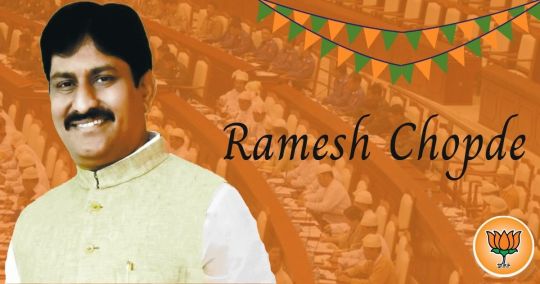
His leadership within the BJP West in Nagpur is an indication of a strong presence in local politics, greatly advancing the goals of the party and developing its hold in the area. His diverse skills and commitment to community welfare make him an asset to both the political landscape and the constituents he serves. His capacity for long-term planning and strategic thought has come in useful in a variety of capacities. Whether it's dealing with neighborhood problems or promoting green initiatives. He succeeds at mentoring and motivating people and is a born leader. He has proven his ability to lead by example and overcome obstacles in a variety of roles by taking the initiative and making wise decisions and constant devotion to moral values is one of his best-known characteristics. He gains the respect and trust of everyone around him by acting honestly and openly. His credibility in both the personal and professional domains is bolstered by his unwavering integrity. Ramesh Chopde has earned a reputation as a cooperative member of the community and in political circles. His cooperative style encourages cooperation between disparate groups, strengthening the group's sense of identity and fostering success. His skill at long-term planning and strategic thinking has come in handy in several events, whether he's advocating for green projects or solving local issues. He exemplifies natural leadership traits and is excellent at inspiring and guiding others. He has proven in many roles that he can lead by example and overcome difficulties through solid decision-making and taking an active role. His strong commitment to moral principles is a well-known quality that helps him win the respect and confidence of those around him. Chopde's unfailing integrity adds to his credibility in his private and professional lives. His ability to think strategically and plan for the long term has been an asset in various roles. Whether addressing local issues or contributing to environmental initiatives, Ramesh Chopde demonstrates a forward-thinking approach to problem-solving.
Visit our Website: https://rameshchopde.in/
#bjpwestinnagpur#councilor#maharashtrapollutioncontrolboard#nmc#politicianrameshchopde#rameshchopdeinbjp
0 notes
Text
BJP Launches Voter List Revision Campaign in Jamshedpur
Door-to-Door Initiative Aims to Update Rolls Ahead of State Assembly Elections Party workers to focus on adding young voters and removing deceased names from electoral lists. JAMSHEDPUR – The Bharatiya Janata Party (BJP) has announced a comprehensive door-to-door campaign to revise voter lists in preparation for the upcoming State Assembly elections. "Our workers will ensure every eligible voter…

View On WordPress
#जनजीवन#BJP environmental initiatives#BJP grassroots mobilization#BJP voter list revision Jamshedpur#Ek Pedh Ma ke Naam campaign#Jamshedpur political activities#Jharkhand Assembly election preparations#Jharkhand electoral roll updates#Life#Mann ki Baat booth programs#Sudhanshu Ojha BJP Mahanagar President#voter registration drive
0 notes
Text
Chhattisgarh: Where Tradition Meets Headlines
Chhattisgarh, nestled in the heart of India, is a land of breathtaking waterfalls, ancient tribal customs, and bustling megacities. It's a place where serene beauty meets modern progress, and where the news headlines are as vibrant as the local bazaars. Let's dive into the top trending stories from Chhattisgarh news , offering a glimpse into the state's captivating narrative:
1. Saffron Surge: BJP Triumphs in Chhattisgarh Elections
The recent assembly elections painted Chhattisgarh a saffron hue. The BJP, with 54 seats in the 90-member assembly, dethroned the incumbent Congress after 15 years of rule. This historic shift in power has sent shockwaves through the political arena, with everyone's eyes on how the newly formed BJP government will navigate the state's future.
2. Rebuilding Lives After Cyclone Michaung's Devastation
Cyclone Michaung unleashed its fury on Chhattisgarh, leaving a trail of destruction in its wake. Torrential rains caused rivers to overflow, roads to submerge, and houses to crumble. While the storm has weakened, the state grapples with the aftermath. Evacuations are in full swing, relief materials are being distributed, and damage assessment is ongoing. The government has urged caution and vigilance, especially in low-lying areas.
3. Raipur Rolls Out the Red Carpet for RIFF: A Cinematic Extravaganza
Amidst the political and environmental challenges, Raipur prepares to roll out the red carpet for the prestigious Raipur International Film Festival (RIFF). This event promises a cinematic extravaganza, featuring renowned filmmakers, critically acclaimed movies, and thought-provoking workshops. RIFF not only celebrates the art of storytelling but also fosters cultural exchange and positions Chhattisgarh firmly on the global cinematic map.
4. From Poaching Haven to Tiger Paradise: Conservation Efforts Roar to Success
Chhattisgarh's lush forests were once notorious for rampant tiger poaching. However, recent reports indicate a significant rise in tiger population, painting a picture of hope. This positive development is attributed to relentless anti-poaching measures, habitat protection programs, and active community involvement. The news serves as a beacon of hope for wildlife enthusiasts and signifies a commendable shift in the state's ecological balance.
5. Startup Ecosystem Thrives: Young Minds, Big Dreams, and a Booming Chhattisgarh
Chhattisgarh is rapidly transforming into a breeding ground for ambitious entrepreneurs. The state's supportive policies, readily available skilled workforce, and growing infrastructure are attracting young minds brimming with innovative ideas. Incubators, accelerators, and mentorship programs are nurturing these ideas, turning them into successful startups that not only drive economic growth but also create new opportunities for the youth.
These are just a few snippets from the ever-evolving news tapestry of Chhattisgarh. From political milestones to environmental concerns, social initiatives to cultural extravaganzas, Chhattisgarh's trending news offers a window into the heart of this dynamic state. So, stay tuned, keep exploring, and discover the many facets of Chhattisgarh that keep it constantly in the spotlight!
Bonus:
Craving more Chhattisgarh-specific news? Here are some reliable sources to keep you updated:
Chhattisgarh News: https://epaper.naidunia.com/epaper/raipur-all-editions-epaper.html
The Raipur Times: https://timesofindia.indiatimes.com/city/raipur
Chhattisgarh Guardian: https://thedailyguardian.com/
Don't forget to follow us on social media for the latest updates and interesting stories from Chhattisgarh!
We hope this article has served as a captivating glimpse into the vibrant state of Chhattisgarh and its ever-changing news landscape. Come, explore Chhattisgarh with us, and discover the stories that make it a land of constant movement and kemajuan!
0 notes
Text
Chhattisgarh Top News Report: A Roundup of the State's Latest Developments
Chhattisgarh Top News Report: A Roundup of the State's Latest Developments
Chhattisgarh, a state in central India, is known for its rich cultural heritage, stunning natural beauty, and rapid economic development. The state has been in the news for a variety of reasons lately, from political developments to social initiatives. Here's a roundup of some of the top news from Chhattisgarh:
1. Political Arena: Upcoming Assembly Elections
The upcoming assembly elections in Chhattisgarh are the most prominent news in the state. The ruling Bharatiya Janata Party (BJP) is looking to retain power, while the opposition Congress party is vying for a comeback. The election campaign has been intense, with both parties making promises of development and prosperity for the state.
2. Social Initiatives: Addressing Pressing Issues
The Chhattisgarh government has launched several social initiatives to address pressing issues and improve the lives of its citizens. One such initiative is the "Mukhyamantri Gram Suraj Yojana," which aims to provide electricity to all villages in the state by 2024. Another initiative is the "Godhan Nyay Yojana," which provides financial assistance to cattle farmers.
3. Economic Advancements: A Thriving Economy
Chhattisgarh has witnessed significant economic growth in recent years. The state has attracted major investments in steel, power, and cement production. The government is also focusing on developing the state's tourism industry, which has the potential to boost the economy further.
4. Infrastructure Development: Laying the Foundation for Growth
The Chhattisgarh government is investing heavily in infrastructure development. The state is building new roads, bridges, and power plants. These projects are expected to improve connectivity and enhance the quality of life for the people of Chhattisgarh.
5. Environmental Concerns: Protecting the Environment
Chhattisgarh is home to a rich biodiversity and a variety of wildlife. However, the state is also facing environmental challenges, such as deforestation and pollution. The government has taken steps to address these issues, but more needs to be done to protect the state's natural heritage.
6. Cultural Vibrancy: A Tapestry of Traditions
Chhattisgarh is a state with a rich cultural heritage. The state is home to a variety of tribal communities, each with its own unique traditions and festivals. The state is also known for its handicrafts, music, and dance.
These are just a few of the many news stories that have been making headlines in Chhattisgarh lately. The state is a dynamic and vibrant place, and it is sure to continue to make news in the years to come.
0 notes
Text
Headlines: Thursday, October 1, 2020
Foreign observers note ‘chaos,’ ‘rancor’ in US debate (AP) “Chaos, interruptions, personal attacks and insults,” one outspoken Chinese newspaper editor said of the U.S. presidential debate. An Australian counterpart said it was “swamped” by the “rancor engulfing America.” The first debate pitting Republican President Donald Trump against Democratic challenger Joe Biden was not a highlight of political oratory in the eyes of many overseas. Yet interest ran high for its potential impact on what may be the most consequential U.S. election in years, now just over a month away. “The spiteful debate mirrors a country that is no longer even capable of having a dignified discussion,” read a scathing editorial published by Switzerland’s right-leaning Neue Zürcher Zeitung newspaper. Hu Xijin, editor of China’s nationalistic Communist Party tabloid Global Times, offered his opinion on the newspaper’s official microblog, writing that the “chaos, interruptions, personal attacks and insults” on display were a reflection of America’s “overarching division, anxiety and the accelerating erosion of the system’s original advantages.” The editor-at-large of the newspaper The Australian, Paul Kelly, described the debate as a “spiteful, chaotic, abusive, often out-of-control brawling encounter with both candidates revealing their contempt for each other.” A columnist for the newspaper, Peter Hoysted, called the debate a “shout-athon” and a “verbal shambles” that reflected American political life and the “yawning gap between the left and right.” A Emirati political scientist, Abdulkhaleq Abdulla, asked, “How did America reach this level of political decline?”
RVs are booming (WSJ) Another effect of the pandemic, perhaps because people want to leave big cities or can work from anywhere? Thor Industries, which makes recreational vehicles, is reporting that they have an order backlog valued at $5.74 billion, up from about $2 billion a year ago. People—even younger people—are snapping up RVs, and an industry group is projecting a 19.5 percent increase in shipments come 2021. In the fiscal year ending July, sales at Thor were up 4 percent, hitting $8.17 billion.
New round of protests shakes Venezuela as public services fail (Reuters) A new round of protests has started to sweep across Venezuela as discontent intensifies in the country’s near-abandoned interior due to worsening fuel shortages and the constant failure of public services, a local non-governmental organization said on Tuesday. According to reports received by the Caracas-based Venezuelan Observatory of Social Conflict, over 100 protests have taken place since the weekend in 19 of Venezuela’s 23 states to demand authorities provide water, power and fuel. The OPEC nation’s collapsed oil industry is no longer able to supply Venezuelans with fuel for their cars, and years of mismanagement and corruption have left much of the infrastructure bringing power and water to homes in ruins. In the past, Caracas was the center of Venezuela’s protest movements, but the government has prioritized fuel deliveries to gas stations in the capital, keeping its streets mostly calm. In the rest of the country, Venezuelans spend days queueing for gasoline that often never arrives. “We’re looking at a new wave of protests with the particularity that this time the protagonists are those living in Venezuela’s villages and towns,” Marco Ponce, the observatory’s director, told an online press conference.
Vilified Early Over Lax Virus Strategy, Sweden Seems to Have Scourge Controlled (NYT) The scene at Norrsken House Stockholm, a co-working space, oozed with radical normalcy: Young, turtleneck-wearing hipsters schmoozed in the coffee corner. Others chatted freely away, at times quite near each other, in cozy conference rooms. Face masks were nowhere to be seen. It seemed very last January, before the spread of Covid-19 in Europe, but it was actually last week, as many European nations were tightening restrictions amid a surge of new coronavirus cases. In Sweden, new infections, if tipping upward slightly, still remained surprisingly low. Almost alone in the Western world, the Swedes refused to impose a coronavirus lockdown last spring, as the country’s leading health officials argued that limited restrictions were sufficient and would better protect against economic collapse. Analyses show that Sweden’s death rate at the height of the pandemic in the spring far surpassed the rates in neighboring countries and was more protracted. Now, though, the question is whether the country’s current low caseload, compared with sharp increases elsewhere, shows that it has found a sustainable balance, something that all Western countries are seeking eight months into the pandemic.
Madrid heads for lockdown after Spain announces new virus restrictions (Reuters) Madrid residents are set to be barred from leaving the city except on essential trips under new coronavirus restrictions announced by the Spanish government on Wednesday. The city’s borders will also be closed to outsiders for non-necessary visits under the new measures for large municipalities with high coronavirus infection rates. Another nine cities in the metropolitan area will also be affected. People will be allowed to cross municipal boundaries to go to work or school, visit the doctor or go shopping, but must remain within the city for leisure activities, according to the agreement. Other measures include the closure of bars and restaurants at 11 p.m., from a previous curfew of 1 a.m., as well as the closure of public parks and playgrounds. Social gatherings will be limited to six people.
EU slams Poland, Hungary as cash-for-democracy fight heats up (Reuters) The European Union’s executive slammed Poland and Hungary on Wednesday for failing to live up to core democratic standards, giving ammunition to those in the bloc pushing to shut them out from funding unless they beef up freedom of media and courts. The European Commission’s first report on shortcomings in the rule of law comes as the bloc is making access to EU money, including a new 750 billion euro coronavirus recovery fund, conditional on respecting democratic checks and balances. Warsaw and Budapest are at odds with the EU over undercutting democracy through putting courts, media, NGOs and academics under more state control. Bulgaria, Romania, Croatia and Slovakia were also criticised for shortcomings in ensuring their courts’ independence. The Commission decried corruption scandals in Bulgaria, Slovakia, Croatia, the Czech Republic, Hungary and Malta.
New sanctions on Lukashenko (Foreign Policy) The United Kingdom and Canada both imposed sanctions on Belarusian President Aleksandr Lukashenko and several senior officials in his government over allegations of election rigging in last month’s presidential election. The sanctions, the first of their kind for major Western powers, include travel bans and asset freezes. Western governments were initially reluctant to challenge Lukashenko due to his close relationship with Russian President Vladimir Putin, but they have ramped up the pressure this week after Lukashenko was inaugurated in a secret ceremony last weekend.
Indian court acquits Hindu nationalist leaders accused of demolishing 16th-century mosque (Washington Post) It was one of the most divisive moments in modern Indian history: the illegal razing of a 16th-century mosque in the town of Ayodhya in 1992 by a mob of Hindu extremists. Nearly three decades later, a judge on Wednesday delivered a long-awaited verdict in the case. All 32 people on trial—who stood accused of conspiring to destroy the structure and stoking religious enmity—were acquitted. They included several senior politicians from India’s ruling party and a sitting member of Parliament. The ruling marks a watershed in the country’s bitterest religious dispute. The conflict has led to thousands of deaths and fueled the rise of the Hindu nationalist movement that today dominates Indian politics. Saba Naqvi, author of a book on the recent history of the BJP, said she was stunned by the verdict. The destruction of the Babri Mosque was “the most public crime in contemporary India,” Naqvi said, yet “the judge has let everyone go.” The ruling sends the message that “there are certain crimes for which people will not be punished,” she said.
Bangladesh and the fashion industry (CNN) The fashion industry uses 93 billion cubic meters of water annually, and the environmental impacts of that are difficult to comprehend. When it’s said that “water is used,” it’s not like it boils off or is used and then cleaned, it means used mostly during the finishing and dyeing process and then just dumped back into the river full of chemicals and dyes. Those chemicals are particularly difficult to remove and dyes by design don’t degrade easily—otherwise they wouldn’t be used to permanently color apparel—and the result is that rivers in Bangladesh (where textiles account for 20 percent of GDP and employ 4 million people) are seriously polluted.
In Japan, a revolutionary response to the pandemic: Better work-life balance (Washington Post) Picture the traditional grind of the Japanese salaryman: the corporate warrior in suit and tie, commuting to the office in a packed subway train, working long hours then drinking with his boss and coming home to a cramped Tokyo apartment. Then imagine another type of worker—perhaps a woman—cycling to her office on a picturesque island, with an equally challenging career but spending her weekends by the sea, immersed in nature or relaxing in a hot spring. That’s the vision of Yasuyuki Nambu, the chief executive of Japanese employment and staffing company Pasona, who aims to move its headquarters from Tokyo, population 37 million, to the Japanese island of Awaji in the Seto Inland Sea, population 129,000. It’s a revolutionary idea in Japan’s rigid corporate culture—and a sign of how the coronavirus pandemic is reimagining where and how people work worldwide. In Japan, working from home was almost unthinkable before the pandemic, but now appears to be gathering some momentum. Some innovators, such as Nambu, are even looking to shift offices to less stressful locales to introduce a novel concept in Japan: a bit more work-life balance. But many in Japan have fought it. A July survey of 14,300 companies by Tokyo Shoko Research found that 42 percent had never implemented working from home despite government appeals to control the spread of the coronavirus.
A new age of mercenary wars (Washington Post) Dozens have been reportedly killed amid ongoing clashes between Azerbaijani and Armenian forces in Nagorno-Karabakh, a mountainous enclave of ethnic Armenians encircled by Azerbaijani territory. Both Turkey and Armenia allege that the other side is importing mercenaries to the front lines. The Guardian reported that a group of Syrian fighters from Idlib province, the lone rebel-held bastion where Turkey holds considerable sway, were recruited in recent weeks to work for a private Turkish security company operating in Azerbaijan. According to the outlet’s sources, as many as 20 such fighters may have been killed in fighting this week in the Caucasus. Ankara denies these claims and has wheeled around on Armenia, accusing the government in Yerevan of busing in Kurdish militiamen from the outlawed Kurdistan Workers’ Party, or PKK, to help train Armenian fighters in Nagorno-Karabakh. These charges point to a broader emerging phenomenon of mercenary outfits on the front lines of the 21st century’s wars. Turkey, after all, established a template for enlisting Syrian fighters for its proxy wars when it transported hundreds to Libya to aid the government in Tripoli. But Ankara is hardly alone on this front. The Wagner Group, a Kremlin-linked Russian private security company, has deployed mercenaries over a wide spectrum of the world’s battlefields, from eastern Ukraine to Syria and Libya. And, often with the financial support of the United Arab Emirates, Sudanese fighters have served as ground troops in civil wars in Yemen and Libya. The prevalence of Syrian fighters in places like Libya, argued Frederic Wehrey, a senior fellow at the Carnegie Endowment for International Peace, reflects “a global trend toward the outsourcing of extraterritorial military force driven partly by the availability of itinerant, pay-for-hire fighters from failed revolutions and civil wars in Africa and the Middle East and the growth of private military companies.”
Gazans left stranded abroad by Israeli-Palestinian standoff (AP) For the last four months, Ahmed al-Kurdi, his wife and three children have been stranded in Jordan, where they traveled from their home in the Gaza Strip for life-saving medical treatment for his 2-year-old daughter. They find themselves stuck, not because of quarantine measures, but because of a dispute between Israel and the Palestinian Authority. They need an Israeli permit to return to Gaza through the occupied West Bank and Israel, which would normally be facilitated by the PA’s civil affairs division. But the Palestinians officially cut off all ties with Israel in May to protest its plans to annex parts of the West Bank, making it even more complicated to get permission to travel. The Palestinians had hoped to pressure Israel by forcing it to assume more of the burden of its half-century occupation of the territory. Instead, the decision has mainly hurt ordinary Palestinians, underscoring the control Israel exerts over nearly every facet of their lives. Al-Kurd and his wife, who left Gaza with their children last December, have been on unpaid leave, relying on relatives to pay rent and support them in Amman, Jordan’s capital, where prices are much higher than in Gaza. They are among dozens of families who left Gaza for health or other reasons and cannot return. They applied for a permit through the Palestinian Embassy in Amman but were told it is no longer in contact with Israel.
0 notes
Text
Meet ‘Top 50 Newsmaker Indians in 2020’ surveyed by Fame India & Asia Post Survey
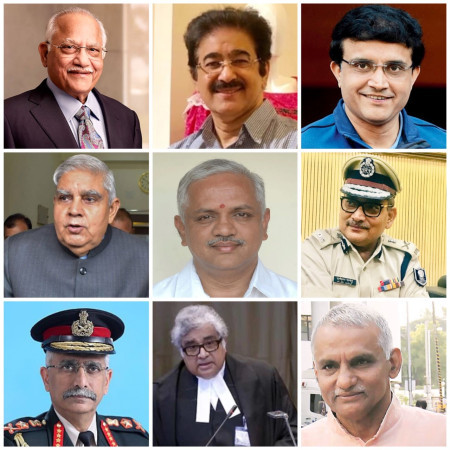
New Delhi: India is considered as a land full of opportunities. Like most other democracies, this country too is very politically and economically charged. Everyone appears to have a view on how the nation should run. People here have created benchmarks of social service. Their efforts demanded us to prepare a list of newsmaker Indians that created ripples of impact. Hence, Fame India & Asia Post together came up with the list of ‘Top 50 Newsmaker Indians in 2020’.
This list is a survey of such famous countrymen, who created change through their efforts in the lives of people. There are hundreds of people who, from their own places, are working towards strengthening the nation. All these people have tried to change, develop and strengthen the possibilities in people’s lives with their excellent works and efforts.
The list includes people from all walks of life who are politicians, bureaucrats, film stars, journalists, artists, educationists, industrialists and spiritual leaders. Those who are involved in the public sphere, who are trying to make people’s lives simpler and more capable, those who are creating a benchmark of social work.
Fame India & Asia Post has tried to compile the list of these newsmakers together that will motivate more Indians to work harder for a brighter and better India. At the release of the list, editorial director of the Magazine Fame India, US Sonthalia said “These are those inspirational Indians who have tirelessly worked towards the betterment of common people. This positive initiative of Fame India, along with selecting them, makes other empowered people like them realize that they should move strongly on their duty path”.
Here is the list of ‘Top 50 Newsmakers in 2020’ by Fame India & Asia Post Survey:
Sandeep Marwah – Educationist, Philanthropist, International Media Person, Social Reformer (Chairman – AAFT), Krishnaswamy Kasturirangan – Chairman – National Education Policy Committee, K Parasaran – Law Advocate – Shri Ramlala Virajman, Gen. Manoj Mukund Narwane – Chief of Army Staff, MS Swaminathan – Agricultural Scientist, Manoj Modi – Famous Corporate & Industrial Strategist, Director – Reliance Group, Gupteshwar Pandey (IPS) – DGP, Bihar, Indian Police Services
Manan Mishra – Chairman – Bar Council of India, Dr Pratap Chandra Reddy – Health, Chairman – Apollo Hospital, Harish Salve – Senior Advocate – Supreme Court, Muthayya Vanitha – Scientist, Project Director – Chandrayaan Mission, Dr Devi Prasad Shetty – Founder – Narayan Hospital, BL Santhosh – Politics, National General Secretary – BJP, Girish Chandra Murmu – CAG
Sanjay Kothari – Commissioner – Central Vigilance Commission Shashikant Das – Governor – RBI, Rakesh Jhunjhunwala – Investment Banker, known for share market predictions, Jagdeep Dhankhar – Governor, West Bengal, Champat Rai – Social worker, General Secretary, Shri Ram Janma Bhoomi Teerth Kshetra Trust, Ayodhya, Sourav Ganguly – BCCI Chief, Swami Awadheshanand Giri – Spiritual Guru, President – Juna Akhada, Madhu Pandit Dasa – Samaj Reformer, President – Akshaya Patra Foundation, Sant Balbir Singh Seechewal – Social Reformer, Environmental hero, Punjab
Jyotiraditya Scindia – MP – Rajya Sabh, Prof Dr Jagat Ram – Director – PGI Chandigarh, Prashant Kishore – Political Strategist, Founder – I-PAC, Dr Kishore Singh – HOD – Oncology, LNJP Hospital, Delhi, Dr Shiv Kumar Sarin – Director – ILBS, Delhi, Ravi Kalra – Social Reformer, Founder – Earth Saviors Foundation, Sambhaji Bhide – Social Reformer, Founder – Shri Shivpratisthan Hindusthan, Maharashtra, Dr MV Padma Srivastava – HOD – Neurology Department, AIIMS, Delhi, Dr Prakash Baba Amte – Social Reformer, Tribal Welfare – Maharashtra, Dr Uma Kumar – Head – Rheumatology Department, AIIMS, Delhi.
Ela Ramesh Bhatt – Social Reformer, Founder- Seva Foundation, Rajendra Singh – Social Reformer, Famous Environmentalist, MA Yusuf Ali – Businessman and philanthropist, Chairman Lulu Group International, Dubai, Ashok Bhagat – Social Reformer, Tribal Welfare, Secretary, Vikas Bharti, Jharkhand, Ajit Mohan – Youth Icon, Managing Director – Facebook India, Dr C. Rajkumar – Dynamic Educationist, Vice-Chancellor – OP Jindal Global University, Sunitha Krishnan – Social Reformer, Co-founder – Prajjavala
Ashish Dhawan – Entrepreneur, Educationist, Philanthropist, Chairman Trustee – Ashoka University, Manish Maheshwari – Youth Icon, Managing Director- Twitter India, Sonu Sood – Film Actor, social worker, Philanthropist, Abhinandan Sharma – Wing Commander – Indian Air Force, Mahesh Savani – Industrialist & philanthropist, Chairman – Savani Group, Mukesh Patel – Industrialist & Social Service, Director- Hindwa Group, Sharma – Journalism, News Director – TV9 Bharatvarsha, Pratap Chand Agrawal – Educationist, philanthropist, Sanjay Bihari – Social Reformer, Founder, Samarth Bihar, Manish Mundra – film producer, philanthropist
0 notes
Text
Soros and India
By: Chitra Patel Is George Soros angry with Modi or with his failed ambitions? Billionaire Philanthropist George Soros recently delivered a speech in Davos where he accused Indian Prime Minister Narendra Modi of creating a Hindu National State and threatening to deprive millions of Muslims for their citizenship. But who George Soros exactly is and what are his connections to India? In 1969, George Soros started hedge fund management and eventually grew through the European Exchange Rate Mechanism in 1992 where he sold short more than $10 Billion in pounds profiting for $1 Billion. He is tagged as the ‘the man who broke Back of England’ and caused Black Wednesday. With this profit he started “Open Society Foundation” George Soros developed he theory of reflexivity which states that “market values are often driven by fallible ideas of participants, not only by economic fundamental situations”. Ideas and events influence each other in reflexive feedback loops. In short, theory of reflexivity is a redefined and implementable session of psychological war. This is the reason Soros is regarded as ‘the puppet master’ of various global controversies and crises. George Soros: Financial Spectator, Stock Investor, Philanthropist and Liberal Political Activist. Soros first visited India in December 2006, where he described India as a favourable nation with tremendous opportunities. He declared that he will be investing in India. In 2008, Soros Economic Development Fund (SEDF), Omidyar Network and Google.org announced $17 Million to small to medium enterprise companies for India – “Song Investment” at Indian School of Business (ISB), Hyderabad. In 2010, Soros bought 4% stake in Bombay Stock Exchange (BSE) from Dubai Holdings. Twilight Saga – Soros and Omidyar It is believed that 2014 National Elections was funded by Omidyar Network India in support of Modi Government. Jayant Sinha, profiled as Venture Capitalist, Senior Advisor and Independent Director was the Director of Omidyar Network India that time, was also a BJP candidate (Winner) from Hazaribagh, Jharkhand, India. Open Society Foundation was in the list of 11000 banned foreign NGOs by the Indian Government in 2014-15 session. This might have triggered the hatred of Soros towards Modi as his foundation was involved heavily in Indian NGOs and SMEs. More importantly Soros criticised Modi for specially banning Christian NGOs, he also said that Modi’s vision is to eliminate every community from India other than Hindus as he himself originated from RSS, a Hindu devoted organization. The Make Over – Aspada Aspada was founded in 2009 and believed to be managing $100 Million in capital. In 2011, Aspada Foundation acquired Song, majority stakes of which were owned by SEDF. In 2013, Aspada Foundation committed $10 million to early stage businesses to make education, healthcare, and financial services more accessible to low-income people in India. Aspada also invested in agricultural supply chain companies in an effort to support small holder farmers. Aspada Foundation received that $10 million from the Soros Economic Development Fund (SEDF) and worked to promote economic opportunity and sustainable impact in India. In 2014, they committed additional $15 Million to Aspada. Additionally, in March same year, it invested Rs 10 crore in Mumbai-based non-banking financial company Neo Growth Credit, a NBFC firm funded by Aspada. In 2019, LGT Group, the largest family-owned private banking and asset management group, originally known as The Liechtenstein Global Trust, owned by the Princely House of Liechtenstein, acquired the majority stakes of Aspada from SEDF. Aspada is now LGT Lightstone Aspada but with the same ‘so called’ visionary approach as Soros. Rooted in 90’s In 1994, George Soros and his offshore company Quantum Fund were in India, obviously looking for some easy form of cash. Then Soros Fund Management (SFM), reputed to be one of the world's leading fund managers, had already taken up a 33% stake in its tie-up with the GIC Mutual Fund. Another Soros company, Chatterjee Petrochemicals Ltd. (CPL), run by a Soros money handler, Purnendu Chatterjee, has secured 25% equity in Haldia Petrochemicals Ltd., a 36-billion-rupee project near Calcutta. There were also reports that the Quantum Fund NMV, a Netherlands Antilles-based investment house, was picking up stocks from the Bombay stock exchange. Soros's procurement of 33% of the GIC Mutual Fund and investment in the Bombay stock exchange was no surprise, since Soros was considered as “a shark who follows money instead of blood”. But the CPL's procurement of the 25% equity in Haldia Petrochemicals Ltd. offered a clear insight into how the Soros operation functions. According to the reports of Ramtanu and Susan Maitra (renown journalist/authors), the CPL frontman was on Purnendu Chatterjee, a New York-based entrepreneur with ethnic ties into West Bengal. Chatterjee was given a boost by the local media as an investor par excellence, and, in due time, he made contact with the ostensibly Marxist Chief Minister of West Bengal, Jyoti Basu. Basu, whose British connections were always underplayed, went through with the deal without really checking the pedigree of the CPL, Soros, Quantum Fund, et al. As Ramtanu and Susan Indian puts it, it was a case of "naïve cunningness" on Chatterjee's part. The Economic Times, a leading daily, was asked on Aug. 17, 1994 that why CPL's mysterious silence about the source of its funding was ignored, The paper reported that Chatterjee had acquired a poor reputation because of his troubles with the American Securities Exchange Commission, and it evinced surprise that he had developed direct contact with the West Bengal chief minister, Jyoti Basu. It would not be the first time in India that non-resident Indian investors, under the guise of giving back to their country some profit of their labour elsewhere, had taken the country for a ride. However, the Indian government's avowed commitment to "globalization" and free-market liberalization, and obsession with money, will no doubt bring more of the sharks like Soros into this rather desperate economic scene. But Soros, whose Quantum Fund N.V. board members include luminaries from such powerful financial operators as N.M. Rothschild and Sons merchant bankers and London based St. James Place Capital, has also been linked to the underground. According to reports from US State Department officials, Quantum Fund raised a huge amount of money to demolish European monetary stability in 1992. During this operation, such well-known criminals as Marc Rich, a fugitive metals and oil dealer now based in Switzerland, and Israeli arms merchant Saul Eisenberg were silent investors, along with a third Soros partner, Rafi Eytan, known as "Dirty Rafi," who had served in London previously as the Israeli Mossad's liaison to British intelligence. Offerings in 2000’s On 28 July 2010 SKS (www.sksindia.com), India’s largest microfinance institution (MFI) with 5.8 million clients, became the first MFI in India to float its shares through an initial public offering (IPO).1 The IPO was successful by any financial market standard: the offering was 13 times oversubscribed and attracted leading investment groups, such as Morgan Stanley, JP Morgan, and George Soros’ Quantum Fund. Also, in 2010 The Indian state of Andhra Pradesh experienced a staggering 200 suicides by farmers in land. It was believed that SKS Microfinance which gave them loans was somehow credible. An 18-year-old girl drank pesticide after she was forced to hand over money meant for an exam fee, leaving a note, “Work hard and earn money. Do not take loans.” Later that year SKS secured an initial US$64 million from a group of 18 anchor investors who agreed to buy 18 percent of the offering at the top of the offering window of INR 985 per share. The anchors included JP Morgan, Morgan Stanley, India ICICI Prudential, Reliance Mutual Fund, and George Soros’ Quantum Fund. Connection to India India’s peculiar Ideology of democracy and the population boom provides potential market attracts businessmen all over the world. It is suspected that the Indian Economy is not being driven by India’s policies or Government, it is more to do with such ‘Internal Businessman’ like George Soros. Like Hillary Clinton in United States (2006 Elections), George Soros through hid numerous ventures, was one of the major funder/donors for Prime Minister Modi. “Not so Digital India” Under PM Modi’s vision of Digital India, The Government of India introduced biometric-based identification (AADHAR), a Unique Identification Authority of India (UIDAI) to help citizens of India enjoy services like opening a bank account, filing tax returns, and availing rations swiftly by digitally authenticating their identity. A team of researchers from the Indian School of Business (ISB) and Digital Identity Research Initiative (DIRI) investigates and monitors the back-end servers of UIDAI. DIRI, launched in 2017, is funded by Omidyar Network India and in 2019 they had given a grant of $1.8 Million to DIRI and committed $500000 more for future grants. “Open Society and Ford Foundation – Under FCRA Scrutiny and Anti-India” George Soros financed radical environmental groups partnering in “Global Climate Strike” to the tune of nearly $25 million. At least 22 of the left-wing activist groups listed as partners in the Global Climate Strike received $24,854,592 in funding from liberal billionaire George Soros between 2000-2017 through his Open Society Network. Among the organizations receiving Soros funding were Fund for Global Human Rights, Global Green Grants Fund, 350.org, Amnesty International, Avaaz, Colour of Change, and People’s Action. Each of these groups has climate-related agendas and goals spanning from reducing global carbon emissions to less than 350 parts per million and 100 percent “clean energy,” to the elimination of new fossil fuel projects and a “green civil rights movement.” The group 350.org, founded by Bill McKibben in 2008, has fought against coal power in India. It is not clear how much funding the Global Climate Strike has actually received from these groups or in total. And, of course, Soros’ funding is over 18 years, so the numbers highlighted are not immediately relevant. But what the investigation does show is how the Strike is being funded by a wide range of left-wing foundations, many of which in turn have relied on Soros money at some stage in the past. This is the list of the relevant Soros donations:

Most of the organisations mentioned above were listed in the banned NGOs under FCRA act by Indian Government in 2014. Open Society has also funded US based NGO Greenpeace, which came under heavy scrutiny by the Indian Government in 2014, which claimed that the NGO’s activities, research, and peaceful protests were “working against the economic progress of the country.” Greenpeace’s FCRA registration was then cancelled in August 2015 due to alleged failure to disclose the movement of funds properly. This cancellation was seen by many observers as heralding a new phase in the interpretation of FCRA regulations wherein the Government of India altered the definition of activities considered harmful to the national interest. The Ford Foundation has faced similar challenges. In March 2015, the foundation was placed in the “prior permission” category after the MHA reportedly found that it was funding non-FCRA registered NGOs, a violation of Section 7 of the FCRA. Earlier that year, the Gujarat government filed a complaint with the MHA that the Ford Foundation’s funded “anti-India” activities of two NGOs–Sabrang Trust and Citizens for Justice and Peace and requested that the FCRA registration of these two NGOs be cancelled. After several months of seeking ministry clearance to process any foreign contributions, the Ford Foundation was taken off the government watch list and was granted the ability to fund its affiliates after registering under the Foreign Exchange Management Act (FEMA), which falls under the jurisdiction of the finance ministry and maintains even tighter regulations that that of FCRA. Read the full article
0 notes